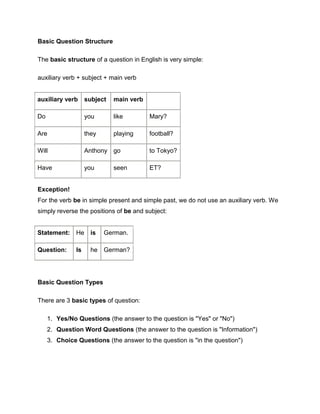Basic question structure
•Descargar como DOCX, PDF•
0 recomendaciones•4,648 vistas
Denunciar
Compartir
Denunciar
Compartir

Recomendados
Más contenido relacionado
La actualidad más candente
La actualidad más candente (20)
Used to, get used to be used to and would slideshare 

Used to, get used to be used to and would slideshare
Future time clauses. when, as soon as, before, after, until

Future time clauses. when, as soon as, before, after, until
Destacado
Destacado (9)
Similar a Basic question structure
Similar a Basic question structure (20)
Más de eIzAmQaRqUn90
Más de eIzAmQaRqUn90 (20)
Basic question structure
- 1. Basic Question Structure<br />The basic structure of a question in English is very simple:<br />auxiliary verb + subject + main verb<br />auxiliary verbsubjectmain verb DoyoulikeMary?Aretheyplayingfootball?WillAnthonygoto Tokyo?HaveyouseenET?<br />Exception!For the verb be in simple present and simple past, we do not use an auxiliary verb. We simply reverse the positions of be and subject:<br />Statement:HeisGerman.Question:IsheGerman?<br />Basic Question Types<br />There are 3 basic types of question:<br />Yes/No Questions (the answer to the question is quot; Yesquot; or quot; Noquot; )<br />Question Word Questions (the answer to the question is quot; Informationquot; )<br />Choice Questions (the answer to the question is quot; in the questionquot; )<br />1. Yes/No Questions<br />auxiliary verbsubjectmain verb AnswerYes or NoDoyouwantdinner?Yes, I do.Canyoudrive? No, I can't.Hasshefinishedher work?Yes, she has.Didtheygohome?No, they didn't.Exception! verb be simple present and simple past IsAnneFrench?Yes, she is. WasRamat home?No, he wasn't.<br />2. Question Word Questions<br />question wordauxiliary verbsubjectmain verb AnswerInformationWheredoyoulive? In Paris.Whenwillwehavelunch?At 1pm.Whodidshemeet? She met Ram.Whyhasn'tTaradoneit?Because she can't.Exception! verb be simple present and simple pastWhereisBombay?In India.Howwasshe?Very well.<br />3. Choice Questions<br />auxiliary verbsubjectmain verb OR AnswerIn the questionDoyouwantteaorcoffee?Coffee, please.WillwemeetJohnorJames?John.Didshegoto LondonorNew York?She went to London.Exception! verb be simple present and simple past Isyour carwhiteorblack?It's black. Werethey$15or$50?$15.<br />
